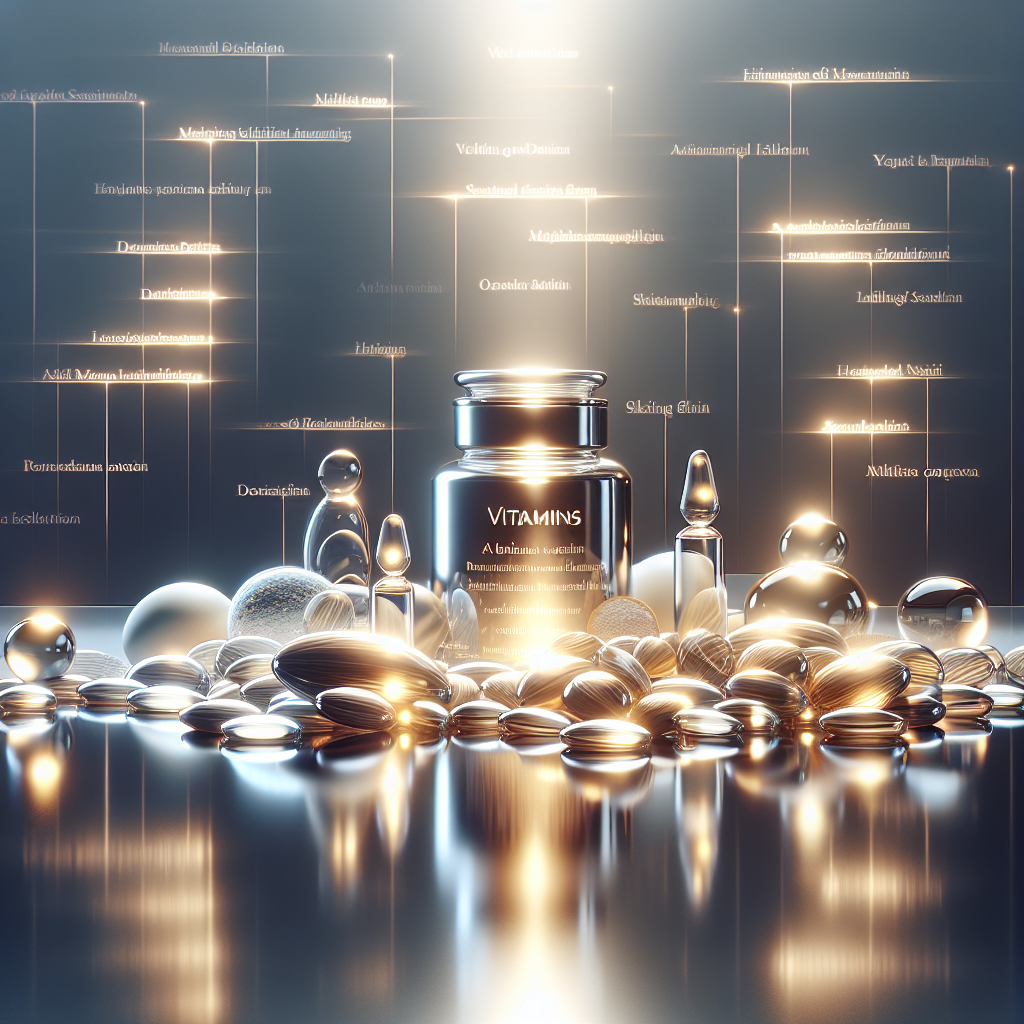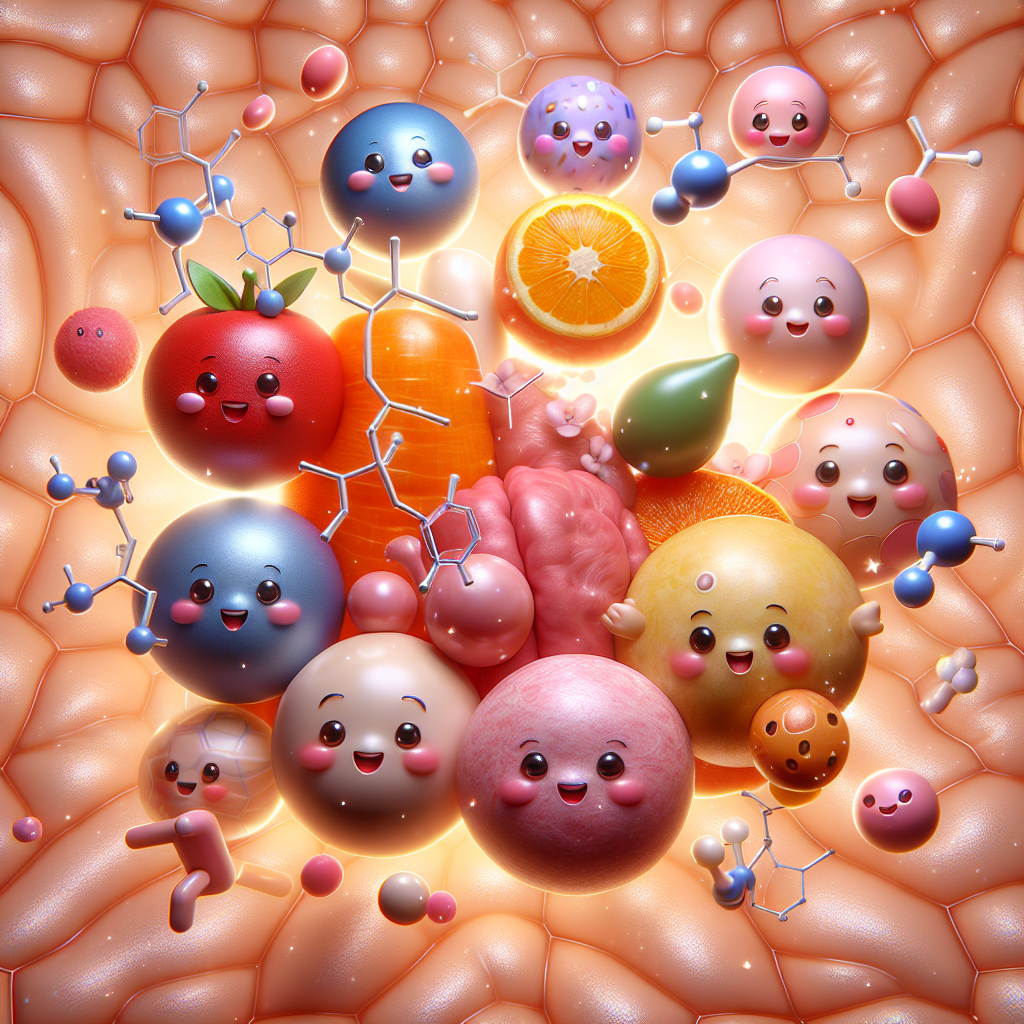Vitamins That Keep Skin Looking Youthful

Discover the secret to youthful-looking skin with our range of vitamins. Don’t wait, rejuvenate your skin today! Click here to explore our products.
Essential Vitamins for Maintaining Youthful Skin
The quest for youthful, radiant skin is a universal pursuit that transcends age, gender, and culture. While many turn to expensive creams, serums, and even surgical procedures to maintain a youthful appearance, the secret to healthy, glowing skin may lie in something much simpler: vitamins. Indeed, certain vitamins play a crucial role in skin health, and incorporating them into your diet can help keep your skin looking youthful and vibrant.
Firstly, let’s consider Vitamin A. This essential nutrient is a powerhouse when it comes to maintaining youthful skin. It aids in the repair and maintenance of skin cells, helping to prevent dry, flaky skin. Moreover, Vitamin A has been shown to reduce the appearance of fine lines and wrinkles, making it a key player in the fight against aging. Foods rich in Vitamin A include sweet potatoes, carrots, and spinach.
Transitioning to another vital nutrient, Vitamin C is renowned for its potent antioxidant properties. These antioxidants combat harmful free radicals that can damage skin cells and accelerate the aging process. Additionally, Vitamin C plays a crucial role in collagen production, a protein that gives skin its elasticity and firmness. Citrus fruits, strawberries, and bell peppers are excellent sources of this essential vitamin.
Next in line is Vitamin E, another powerful antioxidant that protects the skin from damage caused by the sun’s harmful UV rays. By reducing photodamage, Vitamin E helps to keep the skin looking youthful and healthy. It also has moisturizing properties that can help to prevent dryness and flaking. Foods like almonds, spinach, and avocados are rich in Vitamin E.
Vitamin K, though often overlooked, is also essential for skin health. It aids in the body’s blood clotting process, which can help to heal wounds, bruises, and areas affected by surgery. Moreover, Vitamin K can help to reduce dark circles under the eyes, a common sign of aging. Green leafy vegetables, such as kale and spinach, are excellent sources of Vitamin K.
Lastly, let’s not forget about Vitamin D. This nutrient is unique in that our bodies can produce it when our skin is exposed to sunlight. Vitamin D plays a crucial role in skin cell growth and repair, and it can also help to soothe inflamed skin. Fatty fish, cheese, and egg yolks are good dietary sources of Vitamin D, but moderate sun exposure can also provide the necessary daily intake.
In conclusion, maintaining youthful, healthy skin is not solely about what you apply externally, but also about what you consume. Incorporating a variety of vitamins into your diet can significantly improve the health and appearance of your skin. However, it’s important to remember that while vitamins are essential for skin health, they are just one piece of the puzzle. A balanced diet, regular exercise, adequate sleep, and proper hydration are also crucial for maintaining youthful skin. So, the next time you reach for that expensive anti-aging cream, consider reaching for a vitamin-rich fruit or vegetable instead. Your skin will thank you.
The Role of Vitamins in Skin Rejuvenation and Anti-Aging

The quest for youthful, radiant skin is a universal pursuit that transcends age, gender, and culture. While many turn to expensive creams, serums, and even surgical procedures to maintain a youthful appearance, the role of vitamins in skin rejuvenation and anti-aging is often overlooked. Vitamins, both when ingested through diet and applied topically, can play a significant role in preserving the skin’s youthful glow and delaying the onset of aging signs.
Vitamin A, also known as retinol, is one of the most potent vitamins for skin rejuvenation. It stimulates the production of new skin cells, replacing the old, damaged ones, and promotes collagen production, which is essential for skin elasticity and firmness. Retinol also aids in reducing the appearance of fine lines and wrinkles, making it a key player in anti-aging skincare. Foods rich in Vitamin A include carrots, sweet potatoes, and leafy greens, but it can also be found in many over-the-counter skincare products.
Transitioning to another vital vitamin, Vitamin C, it is renowned for its antioxidant properties. These antioxidants combat free radicals, unstable molecules that can cause damage to our skin cells. By neutralizing these free radicals, Vitamin C helps to prevent premature aging and maintain a youthful complexion. Additionally, Vitamin C plays a crucial role in collagen synthesis, contributing to skin firmness and elasticity. Citrus fruits, strawberries, and bell peppers are excellent sources of Vitamin C, and it is also a common ingredient in many skincare products.
Vitamin E, another antioxidant powerhouse, works in tandem with Vitamin C to protect the skin from harmful UV rays and environmental damage. It also aids in skin hydration, preventing dryness and flakiness, which can accentuate the signs of aging. Nuts, seeds, and spinach are rich in Vitamin E, and it is also widely available in various skincare products.
Vitamin B3, or niacinamide, is another essential vitamin for skin health. It improves the skin’s barrier function, helping to lock in moisture and keep out irritants. This results in a smoother, plumper skin texture and a reduction in the appearance of wrinkles and fine lines. Foods like chicken, tuna, and mushrooms are high in Vitamin B3, and it is also found in many anti-aging skincare products.
Lastly, Vitamin K is known for its ability to improve blood circulation and reduce inflammation, which can help to reduce the appearance of dark circles and puffiness under the eyes. It can be found in foods like kale, spinach, and broccoli, and is also available in topical creams and serums.
In conclusion, vitamins play a crucial role in skin rejuvenation and anti-aging. Incorporating a diet rich in these vitamins and using skincare products that contain them can significantly improve the skin’s appearance and delay the signs of aging. However, it’s important to remember that while vitamins can contribute to skin health, they are just one piece of the puzzle. A holistic approach to skincare, including a balanced diet, regular exercise, adequate hydration, and protection from the sun, is essential for maintaining youthful, healthy skin.
Unlocking the Secret to Youthful Skin: Top Vitamins You Need
Unlocking the secret to youthful skin is a quest that has been pursued by many for centuries. In the modern era, the focus has shifted from mythical elixirs to scientifically proven methods. One such method is the use of vitamins, which are essential nutrients that our bodies need to function properly. They play a crucial role in maintaining the health and vitality of our skin, helping to keep it looking youthful and radiant.
Vitamin A, also known as retinol, is one of the most important vitamins for skin health. It promotes cell turnover, which is the process by which old skin cells are replaced with new ones. This helps to keep the skin looking fresh and vibrant. Additionally, vitamin A has been shown to stimulate collagen production, which is essential for maintaining the skin’s elasticity and preventing wrinkles.
Vitamin C is another key player in the quest for youthful skin. It is a powerful antioxidant that helps to protect the skin from damage caused by free radicals, which are harmful molecules that can cause premature aging. Vitamin C also plays a crucial role in collagen synthesis, helping to keep the skin firm and supple. Moreover, it has been shown to help fade dark spots and even out skin tone, giving the skin a more youthful appearance.
Vitamin E is also a potent antioxidant that helps to protect the skin from environmental damage. It works in synergy with vitamin C, enhancing its antioxidant effects. Vitamin E also helps to keep the skin moisturized, preventing dryness and flaking, which can make the skin look older.
Vitamin B3, also known as niacinamide, is another essential vitamin for skin health. It helps to improve the skin’s barrier function, which is crucial for keeping the skin hydrated and protecting it from environmental damage. Niacinamide has also been shown to reduce inflammation, which can lead to premature aging. Furthermore, it can help to reduce the appearance of pores and improve skin texture, giving the skin a smoother, more youthful appearance.
Vitamin K is often overlooked, but it plays a crucial role in maintaining youthful skin. It helps to improve blood circulation, which is essential for delivering nutrients to the skin. Vitamin K also helps to reduce dark circles under the eyes, a common sign of aging.
In conclusion, vitamins play a crucial role in maintaining youthful skin. They help to promote cell turnover, stimulate collagen production, protect the skin from environmental damage, improve the skin’s barrier function, and improve blood circulation. By incorporating these vitamins into your skincare routine, either through your diet or through topical applications, you can help to keep your skin looking youthful and radiant. However, it’s important to remember that while vitamins can help to improve the health and appearance of your skin, they are not a magic bullet. A healthy lifestyle, including a balanced diet, regular exercise, and adequate sleep, is also essential for maintaining youthful skin.